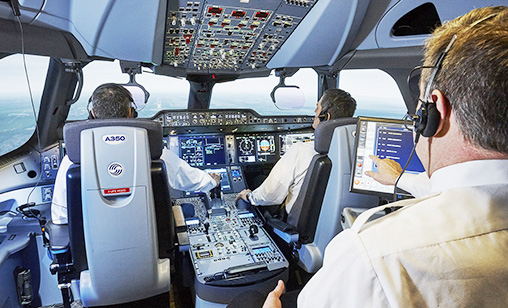Main Story
Artificial Intelligence has lessons to learn from aviation
August 1st 2023
When it comes to regulation of Artificial Intelligence (AI) the tech industry should look to aviation for inspiration, two researchers suggest in a paper prepared for the World Economic Forum. Read More » With its tight regulation and critical safety procedures, aviation offers valuable lessons for AI, Microsoft head of research, ethics and society, Arathhi Sethumadhavan, and Google writer ethics and society, Joe Garvin, wrote.
“If the tech industry adopted similar policies and created a culture of learning it could avert future AI-related catastrophes. It is time we considered the AI industry a safety critical industry. What changes can be made in this high-risk industry to protect people from possible harm while allowing AI innovation to stabilize and flourish? Lawmakers and AI developers can look to the skies and learn from the aviation industry,” the researchers said.
 |
For decades the aviation industry has developed regulations, standard operating procedures, licenses, certifications and training programs that improve communication and teamwork in high stress scenarios, they pointed out.
“Unfortunately, many of these innovations came about as responses to catastrophic accidents and human tragedies. But the aviation industry has addressed its high risk by fostering a culture of learning from errors, asking for help and listening to feedback.
‘We can make AI safer by implementing similar reforms and developing a similar culture: a responsible AI culture where it’s the norm to share useful information about failures and mistakes. Instead of waiting for new AI disasters to surprise us, we have the opportunity now to learn from disasters of the past by implementing these three reforms: comprehensive training programmes, regulation and standardization, and a culture of sharing safety information.”
Crew Resource Management Training (CRM), standard in aviation training, was held up as an example by the authors. “The creation of a wide range of training procedures, known as CRM, was built on the discovery most problems for flight crews did not involve the technical aspects of operating a cockpit, but situational awareness, group decision-making and leadership. Accordingly, CRM targets the cognitive and interpersonal skills people need to use all available resources safely and efficiently,” they said.
“Crucially, CRM accounts for key differences in national cultures in areas such as collectivism, uncertainty avoidance and power distance. Power distance (PD), for example, is the measure of power between a boss and subordinates. In high PD cultures, subordinates avoid approaching their bosses directly and hesitate to disagree with them. It is factors such as these that shape the social dynamics in the cockpit. CRM helps counterbalance these cultural differences. Today, the importance of CRM is recognized worldwide. It is a requirement for all flight crew at various stages of their careers.
“Like flight crew, AI professionals often work in safety critical scenarios alongside people from diverse cultural backgrounds. Let’s not wait for a tragedy to focus on communication and teamwork among AI teams. Aviation industry’s CRM offers inspiration for developing standard and comprehensive training procedures of our own.”
While the aviation industry helps to keep people safe by addressing interpersonal skills with CRM training, it also addresses the technical and operational aspects of the industry with a host of regulatory measures and standardized processes, the authors wrote.
“Officially recognized U.S. Federal Aviation Administration (FAA) licenses and certificates, for example, are necessary for many roles in aviation, with different licenses required depending on whether individuals build and maintain aviation technology (technicians need an aviation mechanic certificate) or operate it (pilots require regular recertification).
“The aviation industry also adheres to many processes, for example, standard operating procedures and official checklists. These shared guidelines minimize errors by promoting consistency and reliability,” they said.
| Asia-Pacific to redefine aviation technology Cloud storage company, Boston-headquartered Wasabi Technologies, has recently expanded its regional leadership team, appointing country managers in Japan and Australia to meet demand for high performance and affordable cloud storage. “With a burgeoning middle class, increasing urbanization and a growing appetite for travel, the Asia-Pacific’s anticipated growth necessitates advanced aviation technologies to enhance operational efficiency, improve safety and reduce environmental impact,” Wasabi said. “The use of artificial intelligence and machine learning in aviation is gaining traction in the region with technologies that optimize flight routes, predict maintenance needs and enhance passenger experiences. “However, it is essential to create a supportive ecosystem that encourages innovation, addresses regulatory challenges and develops the skills to shape aviation technology.” |
megan moroney says:
January 27th 2024 12:23pm